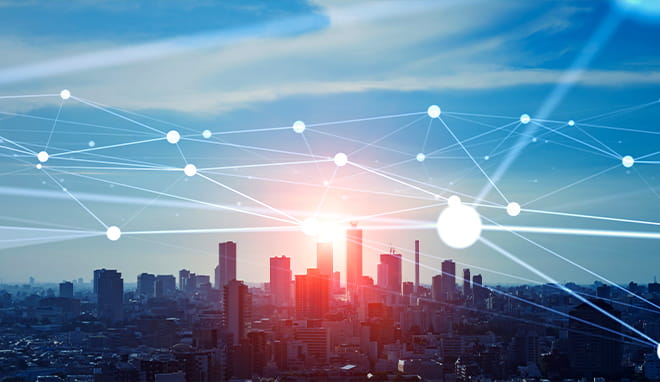About us Activities of the Japan Designated Cities Mayors Association (JDCMA)

Japan’s Local Autonomy System
Japan’s local autonomy system adopts a two-tier system, with basic local governments (municipalities such as cities, towns, and villages) as the first tier, and regional governments (prefectures) as the second tier.
Municipalities handle local issues that are delegated to basic local governments through laws and ordinances.
Prefectures deal with larger-scale issues, including managing coordination between municipalities and addressing issues deemed beyond the purview of municipalities.
Japan’s Large City System
Large cities in Japan can be classified into two systems: the Designated City system and the Special Ward system.
The governments of the 20 designated cities (including Yokohama, Nagoya, Kyoto, Osaka, and Kobe) are operated under the Designated City system (as of April 1, 2023), and the Tokyo Metropolitan Government and its special wards operate under the Special Ward system.

1. Overview of the Designated Cities System
(1) What are Designated Cities?
A designated city is defined in the Local Autonomy Act as a “city with a population of 500,000 people or more, as stipulated by government ordinance.”
Because a designated city is required to have administrative and fiscal functions similar to those of prefectural governments, out of the 792 cities in Japan (as of October 1, 2022), currently only 20 cities with populations of approximately 700,000 or more have been designated as designated cities by government ordinance. Although designated cities cover only 3% of Japan’s total land mass, they are highly populated, with about 27.8 million people living in designated cities, and the total GDP of these cities is over 100 trillion yen.
Per the “Special Provision on Large Cities” in the Local Autonomy Act, designated cities are responsible for certain administrative work that is usually handled by the prefecture in other cities, such as child welfare, public assistance, maternal and child health, food sanitation, tuberculosis prevention, and other matters related to the health and welfare of citizens, as well as administration of urban planning and land adjustment projects.
Designated cities are also unique in their structure in that they are divided into wards, and each ward includes a ward office. These ward offices offer several administrative services including national health insurance, regional revitalization, resident certificate issuance, and other services that directly affect the daily lives of citizens.
(2) Roles of Designated Cities
The major urban areas where designated cities are located have high population densities and significant industrial concentration. Approximately 40% of the population and 30% of the commercial activity in Japan can be attributed to these major urban areas. As such, designated cities can be described as highly converged areas in terms of settlement and communication.
Designated cities play three major roles in regional governance: a governing body that is close to its citizens, the central cities of urban areas, and the pathfinders of urban administration and policies.
As a governing body that is close to citizens
Compared to national and prefectural governments, designated cities have a closer relationship with their residents. Designated cities offer various services and facilities that significantly affect the daily lives of citizens, including welfare, urban development, waste disposal, elementary and junior high school (compulsory schooling), and fire prevention and rescue.
As central cities of urban areas
Designated cities provide not only the basic infrastructure required by increasingly high population densities and industrial concentrations, including roads and railways, but also services that are highly beneficial to corporate and industrial operations, ranging from sewage to ICT infrastructure.
The administration of advanced urban functions such as higher education and central medical facilities is another important role of designated cities.
Designated cities are also responsible for attracting visitors from around the world, hosting international conventions, and engaging in various promotional activities.
Broadly speaking, designated cities take the lead in the development and vitalization of urban areas as a whole.
As pathfinders of urban administration and policies
Faced with various challenges related to the environment, safety, and other factors stemming from high population densities, designated cities continue to create and implement innovative measures as the leaders of the cities of Japan.
2. Overview of the Special Ward System
Under the Special Ward system, the special wards of the Tokyo Metropolis take on administrative responsibilities equivalent to that of a city, with the exception of those that benefit from a broad, unified administration across all special wards, which are instead handled by the Tokyo Metropolitan Government. This system was designed to secure administrative unity and consistency in the densely populated area of Tokyo. Meanwhile, the metropolitan government must take on not only the same administrative responsibilities as a prefecture but also some that are normally fulfilled by cities. This includes water, sewage, and firefighting services, all of which are handled more efficiently and effectively when administered on the broader scale of the metropolitan government rather than each special ward having to provide each service individually. To maintain the financial balance among the special wards and between the metropolitan government and special wards, a proportion of the corporate inhabitant tax, fixed assets tax, and special land ownership tax collected by the metropolitan government is distributed to the special wards. This system promotes the autonomy of the special wards and allows each special ward to conduct well-planned administration based on stable financial forecasts. Although currently there are only special wards in the area of the Tokyo Metropolitan Government, the law allows for designated cities with populations of over 2,000,000 to abolish related municipalities and implement special wards within their prefecture.
About the JDCMA
1. History of the JDCMA
Since the 1920s, the cities of Yokohama, Nagoya, Kyoto, Osaka, and Kobe have advocated for the local autonomy of cities. As a result of these efforts, the special city system, which grants such cities the same administrative authority as prefectures, was legally implemented in 1947. However, backlash from prefectures led to the effective suspension of the system. Despite the continued efforts of the five cities to bring it into reality, the system was abolished in 1956. In its stead, the Designated City system was born. Even after the implementation of the Designated City system, the group of cities has continued to work toward transferring expanded authority to large cities. Over the decades, the number of member cities has increased, and the group officially became the JDCMA in its current form in 2003.
2. Activities of the JDCMA
-

Policy proposals and position statements
The JDCMA expresses the views of designated cities to the national government and other entities on matters such as the advancement of decentralization reform and the national budget.
-

Investigation, research, and publicity of issues pertaining to large cities
The JDCMA compiles and submits reports and recommendations on the environment, safety, security, and decentralization to the national government and related entities. We also host symposiums to raise public awareness of these issues.
-

Arrangement of meetings and communication between designated cities
The JDCMA facilitates communication between cities by holding meetings for designated cities to attend and actively discuss the pressing issues faced by large cities and exchange views on the future of administration in designated cities.
-

Response to disasters
The JDCMA formulated a plan for collaborative disaster response by designated cities (the JDCMA Action Plan for Wide-Area and Large-Scale Disasters) and works to support disaster-stricken areas.
-

International activities
The JDCMA works with the Urban7 (U7) framework in collaboration with associations of cities in G7 countries to emphasize the importance of the role of cities in addressing environmental, economic, and energy-related matters.
Overview
| Name | The Japan Designated Cities Mayors Association |
|---|---|
| Establishment | December 21, 2003 |
| Mayors of Designated Cities |
Mayor of Sapporo City: Katsuhiro Akimoto (Vice Chair) Mayor of Sendai City: Kazuko Koori Mayor of Saitama City: Hayato Shimizu (Vice Chair) Mayor of Chiba City: Shunichi Kamiya Mayor of Kawasaki City: Norihiko Fukuda (Vice Chair) Mayor of Yokohama City: Takeharu Yamanaka Mayor of Sagamihara City: Kentaro Motomura Mayor of Niigata City: Yaichi Nakahara Mayor of Shizuoka City: Takashi Namba Mayor of Hamamatsu City: Yusuke Nakano Mayor of Nagoya City: Ichiro Hirosawa Mayor of Kyoto City: Koji Matsui Mayor of Osaka City: Hideyuki Yokoyama Mayor of Sakai City: Hideki Nagafuji Mayor of Kobe City: Kizo Hisamoto (Chair) Mayor of Okayama City: Masao Omori (Vice Chair) Mayor of Hiroshima City: Kazumi Matsui Mayor of Kitakyushu City: Kazuhisa Takeuchi Mayor of Fukuoka: Soichiro Takashima (Vice Chair) Mayor of Kumamoto City: Kazufumi Onishi (Vice Chair) |
Inquiries
Secretariat of the Japan Designated Cities Mayors Association
Tel: +81-3-3591-4772
Fax: +81-3-3591-4774
Address: 6F Municipal Research Building, 1-3 Hibiya Koen, Chiyoda-ku, Tokyo 100-0012

